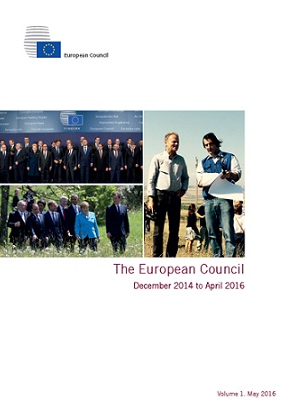Braun, Benjamin, (2016), “Schäuble vs Draghi: German losses from ECB policy are real but self-inflicted”, LSE blog, 12 Μay Germany has recently voiced criticism of the European Central Bank (ECB) from the perspective that its policies, such as quantitative easing, have a particularly negative effect within Germany. Benjamin Braun argues that while there have indeed been German losses from the ECB’s policies, much of the problem stems from the country’s reluctance to …Read More
Banking Crises
Grossman, Richard, (2016), “Banking Crises”, Centre for Economic Policy Research, Μay Financial crises have been a common feature of the economic landscape for more than two centuries. The chapter defines banking crises, considers the type of costs that they impose, and outlines the most common causes of banking crises during the past 200 years. The remainder of the chapter considers five distinct historical periods: the nineteenth century, when the “boom-bust” pattern …Read More
Flexibility versus Stability: A difficult trade-off in the eurozone
De Grow, Paul, Ji, Yuemei, (2016), “Flexibility versus Stability: A difficult trade-off in the eurozone”, CEPS, 29 Αpril Optimal currency area (OCA) theory has been influential in pushing eurozone countries towards structural reforms to make product and labour markets more flexible. The underlying assumption of the OCA prescription for structural reform is that asymmetric shocks are permanent. However, when shocks are temporary it does not follow that more flexibility is the answer. …Read More
Bank Exposures and Sovereign Stress Transmission
Altavilla, Carlo, Pagano, Marco, Simonelli, Saverio, (2016), “Bank Exposures and Sovereign Stress Transmission”, Centre for Economic Policy Research, Μay Using novel monthly data for 226 euro-area banks from 2007 to 2015, we investigate the causes and effects of banks’ sovereign exposures during and after the euro crisis. First, in the vulnerable countries, the publicly owned, recently bailed out and less strongly capitalized banks reacted to sovereign stress by increasing their domestic sovereign holdings …Read More
Key drivers of EU budget allocation: Does power matter?
Zaporozhets, Vera, García-Valiñas, María, Kurz, Sascha, (2016), “Key drivers of EU budget allocation: Does power matter?”, European Journal of Political Economy, Μay We examine the determinants of the EU budget allocation among Member States. In line with the analysis by Kauppi and Widgrén (2004) we test two alternative explanations: political power vs. “needs view” . To do so, we extend the original data set (1976–2001) up to 2012 and introduce alternative econometric specifications. We …Read More
On the Economics of Crisis Contracts
Elias, Aptus, Gersbach, Hans, Volker, Britz, (2016), “On the Economics of Crisis Contracts”, Centre for Economic Policy Research, Μay We examine the impact of so-called “Crisis Contracts” on bank managers’ risk-taking incentives and on the probability of banking crises. Under a Crisis Contract, managers are required to contribute a pre-specified share of their past earnings to finance public rescue funds when a crisis occurs. This can be viewed as a retroactive tax that …Read More
Unravelling multilevel administration. Patterns and dynamics of administrative co-ordination in European governance
Benz, Arthur, Corcaci, Andreas, Doser, Jan Wolfgang, (2016), “Unravelling multilevel administration. Patterns and dynamics of administrative co-ordination in European governance”, Journal of European Public Policy, 20 Αpril The concept of multilevel governance adds a crucial dimension to the debate about political decision-making by conceptualizing policy co-ordination across territorial levels of government. While research on European governance has generated a differentiated analytical concept to understand the varieties of co-ordination, it has not clarified the …Read More
The electoral consequences of the financial and economic crisis in Europe
Hernández, Enrique, Kriesi, Hanspeter, (2016), “The electoral consequences of the financial and economic crisis in Europe”, European Journal of Political Research, Μay The electoral consequences of the Great Recession are analysed in this article by combining insights from economic voting theories and the literature on party system change. Taking cues from these two theoretical perspectives, the impact of the Great Recession on the stability and change of Western, Central and Eastern European …Read More
The European Council: December 2014 to April 2016
European Council, (2016), “The European Council: December 2014 to April 2016”, European Council, Volume 1. May 2016 The European Council faced critical political challenges from December 2014 to April 2016. These included unprecedented flows of asylum seekers and irregular migrants, the need to prevent the exit of Greece from the eurozone and the imperative to find a new settlement for Britain ahead of an In/Out referendum on EU membership. European leaders …Read More
EU Austerity And The Brain Drain From The South
Labini, Francesco Sylos, (2016), “EU Austerity And The Brain Drain From The South”, Social Europe, 10 Μay The debate on the sustainability of the European single currency seems to have focused exclusively on the requirement that EU member states comply with the macro-economic financial parameters established by the dictates of austerity policies. The absence of any collective reflection on how to boost structural economic development is astonishing at a time when …Read More





